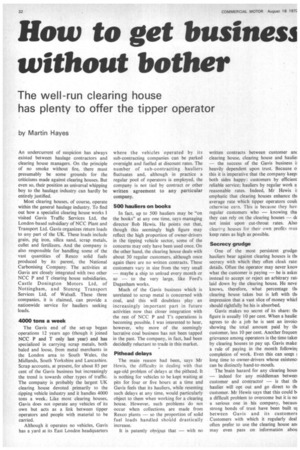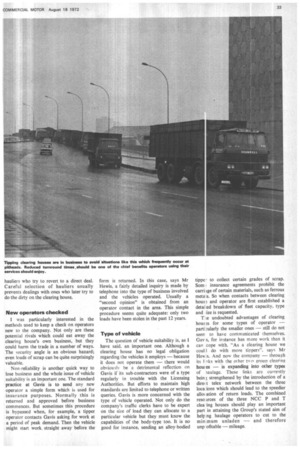How to get business without bother
Page 34

Page 35

If you've noticed an error in this article please click here to report it so we can fix it.
The well-run clearing house has plenty to offer the tipper operator
by Martin Hayes
An undercurrent of suspicion has always existed between haulage contractors and clearing house managers. On the principle of no smoke without fire, there must presumably be some grounds for the criticisms made against clearing houses. But even so, their position as universal whipping boy to the haulage industry can hardly be entirely justified.
Most clearing houses, of course, operate within the general haulage industry. To find out how a specialist clearing house works I visited Gavis Traffic Services Ltd, the London-based subsidiary of NCC Plant and Transport Ltd. Gavis organizes return loads to any part of the UK. These loads include grain, pig iron, silica sand, scrap metals, cutlet and fertilizers. And the company is also responsible for handling some of the vast quantities of Rexco solid fuels produced by its parent, the National Carbonising Company. The activities at Gavis are closely integrated with two other NCC P and T clearing house subsidiaries, Castle Donington Motors Ltd, of Nottingham, and Stenreg Transport Services Ltd, of Walsall. These three companies, it is claimed, can provide a nationwide service for hauliers seeking loads.
4.000 tons a week
The Gavis end of the set-up began operations 12 years ago (though it joined NCC P and T only last year) and has specialized in carrying scrap metals, both baled and loose, from metal merchants in the London area to South Wales, the Midlands, South Yorkshire and Lancashire. Scrap accounts, at present, for about 85 per cent of the Gavis business but increasingly the trend is towards other types of traffic. The company is probably the largest UK clearing house devoted primarily to the .tipping vehicle industry and it handles 4000 tons a week. Like most clearing houses, Gavis does not operate any vehicles of its own but acts as a link between tipper operators and people with material to be carried.
Although it operates no vehicles, Gavis has a yard at its East London headquarters where the vehicles operated by its sub-contracting companies can be parked overnight and fuelled at discount rates. The number of sub-contracting hauliers fluctuates and, although in practice a regular pool of operators is employed, the company is not tied by contract or other written agreement to any particular company.
500 hauliers on books
In fact, up to 500 hauliers may be "on the books" at any one time, says managing director Bob Hewis. He points out that, though this seemingly high figure may reflect the high proportion of owner-drivers in the tipping vehicle sector, some of the concerns may only have been used once. On the other hand, the clearing house deals with about 30 regular customers, although once again there are no written contracts. These customers vary in size from the very small — maybe a ship to unload every month or so — to the very large, like Ford's Dagenham works.
Much of' the Gavis business which is unrelated to scrap metal is concerned with coal, and this will doubtless play an increasingly important part in future activities now that closer integration with the rest of NCC P and T's operations is becoming possible. I was interested to hear, however, why more of the seemingly lucrative coal business has not been tapped in the past. The company, in fact, had been decidedly reluctant to trade in this market.
Pithead delays
The main reason had been, says Mr Hewis, the difficulty in dealing with that age-old problem of delays at the pithead. It is nothing for vehicles to be kept waiting at pits for four or five hours at a time and Gavis feels that its hauliers, while resenting such delays at any time, would particularly object to them when working for a clearing house. However, such problems do not occur when collections, are made from Rexco plants — so the proportion of solid fuel loads handled shol'ild drastically increase.
It is patently obvious that — with no written contracts between customer an clearing house, clearing house and haulie, — the success of the Gavis business ir heavily dependent upon trust. Because o this it is imperative that the company keep: both sides happy: customers by efficient reliable service; hauliers by regular work a reasonable rates. Indeed, Mr Hewis i; emphatic that clearing houses enhance tit( average rate which tipper operators coult otherwise earn. This is because they hay, regular customers who — knowing tha they can rely on the clearing houses — ck not insist upon cut-throat rates. Also clearill a houses for their own profits rnus keep rates as high as possible.
Secrecy grudge
One of the most persistent grudge: hauliers bear against clearing houses is thr secrecy with which they often cloak rate: details. Often the operator may never knov what the customer is paying — he is asket instead to accept or reject an arbitrary ratr laid down by the clearing house. He neve: knows, therefore, what percentage thr clearing house takes but is left with thr impression that a vast slice of money whicl should rightfully be his is absorbed.
Gavis makes no secret of its share: thr figure is usually 10 per cent. When a haulie agrees to do a job he is sent an invoicr showing the total amount paid by thr customer, less 10 per Cent. Another frequen grievance among operators is the time take' by clearing houses to pay up. Gavis maim a rule of paying in the month followin completion of work. Even this can seem ; long time to owner-drivers whose existenci can be distinctly hand-to-mouth.
The Main hazard for any clearing housi — indeed for any middleman betweei customer and contractor — is that thi haulier will opt out and go direct to th, customer. Mr Hewis says that this could Li, a difficult problem to overcome but it is no a serious one in his company, becaus, strong bonds of trust have been built m between Gavis and its customers Customers with which it regularly deal often prefer to use the clearing house am may even pass on information abou
hauliers who try to revert to a direct deal. Careful selection of hauliers usually prevents dealings with ones who later try to do the dirty on the clearing house.
New operators checked
I was particularly interested in the methods used to keep a check on operators new to the company. Not only are these potential rivals which could eat away the clearing house's own business, but they could harm the trade in a number of ways. The security angle is an obvious hazard; even loads of scrap can be quite surprisingly valuable.
Non-reliability is another quick way to lose business and the whole issue of vehicle suitability is an important one. The standard practice at Gavis is to send any new operator a simple form which is used for insurance purposes. Normally this is returned and approved before business commences. But sometimes this procedure is bypassed when, for example, a tipper operator contacts Gavis asking for work at a period of peak demand. Then the vehicle might start work straight away before the form is returned. In this case, says Mr Hewis, a fairly detailed inquiry is made by telephone into the type of business involved and the vehicles operated. Usually a "second opinion" is obtained from an operator contact in the area. This simple procedure seems quite adequate: only two loads have been stolen in the past 12 years.
Type of vehicle
The question of vehicle suitability is, as I have said, an important one. Although a clearing house has no legal obligation regarding the vehicles it employs — because it does not operate them — there would obviously be a detrimental reflection on Gavis if its sub-contractors were of a type regularly in trouble with the Licensing Authorities. But efforts to maintain high standards are limited to telephone or written queries. Gavis is more concerned with the type of vehicle operated. Not only do the company's traffic clerks have to be expert on the size of load they can allocate to a particular vehicle but they must know the capabilities of the body-type too. It is no good for instance, sending an alloy-bodied tippe to collect certain grades of scrap. Som.: insurance agreements prohibit the carri tge of certain materials, such as ferrous meta s. So when contacts between clearing hous 3 and operator are first established a detai ed breakdown of fleet capacity, type and ize is requested.
tie undoubted advantages of clearing hous 3s for some types of operator — parti;ularly the smaller ones — still do not seerr to have conimunicated themselves. Gay s, for instance has more work than it can cope with. "As a clearing house we coul I do with more tippers". says Mr He is. And now the company — through its I nks with the other two group clearing how es — is expanding into other types of laulage. These links are currently bein ; strengthened by the introduction of a dire t telex network between the three loca ions which should lead to the speedier allot ation of return loads. The combined reso _trees of the three NCC P and T clea ing houses should play an important part in attaining the Group's stated aim of help ng . haulage operators to cut to the minimum unladen — and therefore unp .ofitable — mileage.


































































































